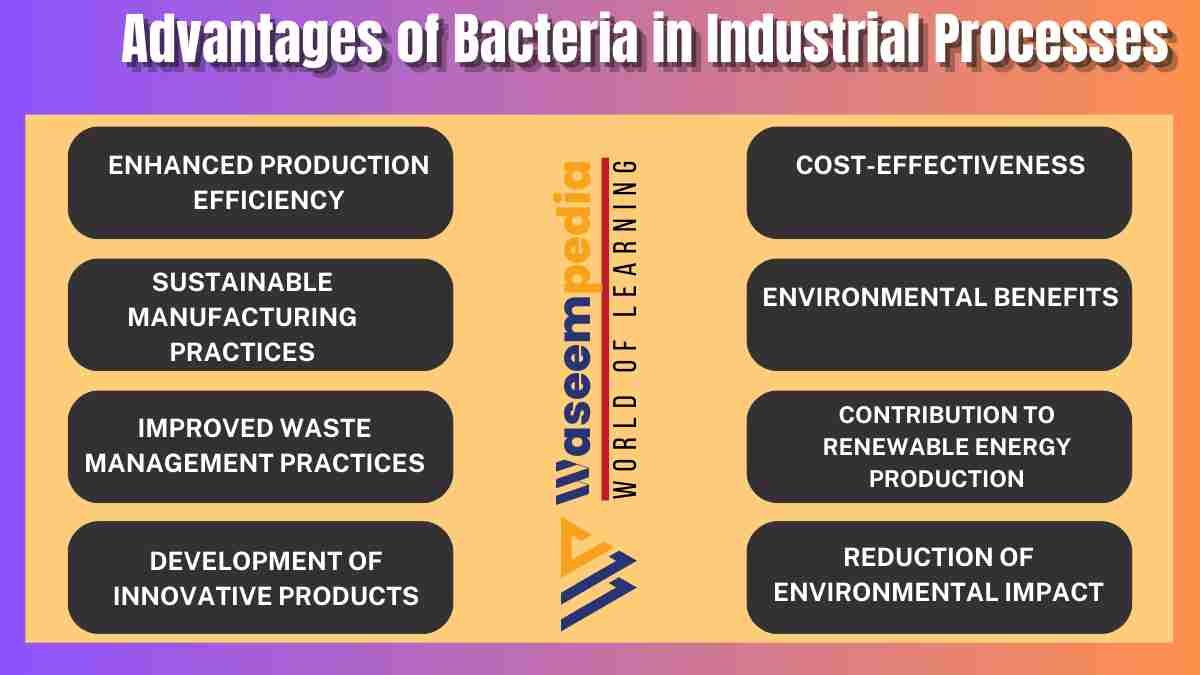Bacteria, the microscopic organisms that exist in a wide range of environments, play a vital role in various industrial processes. Their unique metabolic capabilities and adaptability have made them valuable tools in industries such as food production, pharmaceuticals, waste management, and biofuel production.
The advantages of bacteria in industrial processes are numerous, ranging from increased efficiency and cost-effectiveness to the development of sustainable and environmentally friendly practices. In this article, we will explore the advantages of bacteria in industrial processes and highlight their significant contributions to various sectors.
Bacteria offer numerous advantages in industrial processes, enabling increased efficiency, cost-effectiveness, and sustainable practices. From food production to pharmaceuticals, waste management, and biofuel production, bacteria play a crucial role in various sectors.
Harnessing the capabilities of bacteria allows industries to develop innovative solutions, reduce environmental impact, and contribute to a more sustainable future.
As our understanding of bacteria continues to advance, their potential in industrial processes is expected to grow, opening up new possibilities and opportunities for innovation.
Introduction of Bacteria in Industrial Processes
Industrial processes often require efficient and cost-effective methods to achieve desired outcomes. Bacteria offer unique advantages due to their ability to perform diverse metabolic activities and adapt to different environmental conditions. By harnessing the capabilities of bacteria, industries can improve production processes, develop innovative solutions, and contribute to sustainable practices.
5 Advantages of Bacteria in Industrial Processes
5 Advantages of Bacteria in Industrial Processes are as follows.
1. Bacteria in Food Production
Bacteria play a crucial role in various aspects of food production. In processes like fermentation, bacteria transform raw ingredients into a wide range of products, including dairy products, sauerkraut, vinegar, and many more.
Bacteria contribute to flavor development, texture enhancement, and preservation, extending the shelf life of food. Additionally, specific bacteria are used in probiotic formulations to promote gut health and improve the nutritional value of certain foods.
2. Bacteria in Pharmaceuticals
The pharmaceutical industry benefits from bacteria in multiple ways. Bacteria are utilized in the production of antibiotics, vaccines, enzymes, and other pharmaceutical compounds.
Through genetic engineering techniques, bacteria can be engineered to produce desired substances at large scales, leading to cost-effective production. Bacteria also serve as valuable tools in research and development, enabling the study of various diseases and the development of new treatments.
3. Bacteria in Waste Management
Bacteria play a critical role in waste management processes. In wastewater treatment plants, bacteria are used to break down organic matter and remove pollutants. They help convert complex compounds into simpler forms, reducing the environmental impact of wastewater discharge. Bacteria also contribute to the decomposition of organic waste in landfills, aiding in the production of biogas, a renewable energy source.
4. Bacteria in Biofuel Production
Bacteria have shown immense potential in biofuel production. Certain bacteria can ferment biomass and convert it into biofuels such as ethanol and butanol.
Through genetic engineering, scientists are working on enhancing the efficiency of bacterial biofuel production and expanding the range of biomass sources that can be used. Bacterial biofuel production offers a sustainable alternative to fossil fuels, reducing greenhouse gas emissions and promoting energy independence.
5. Environmental Advantages
The use of bacteria in industrial processes can lead to significant environmental benefits. By utilizing bacteria for waste treatment and biofuel production, industries can reduce pollution, minimize reliance on non-renewable resources, and decrease carbon emissions.
Bacteria also offer potential in bioremediation, the process of using living organisms to clean up pollutants in soil, water, and air, contributing to environmental restoration efforts.

